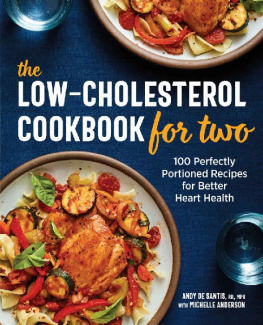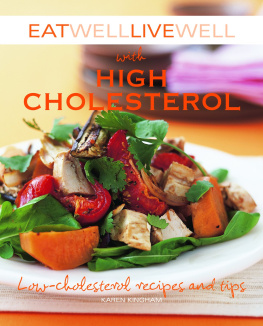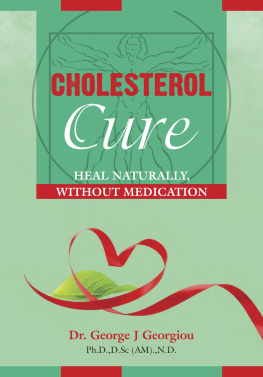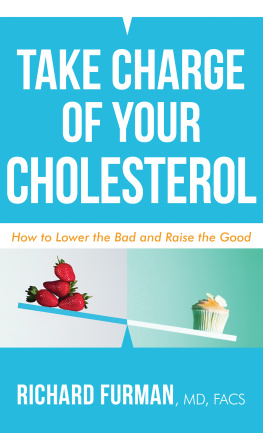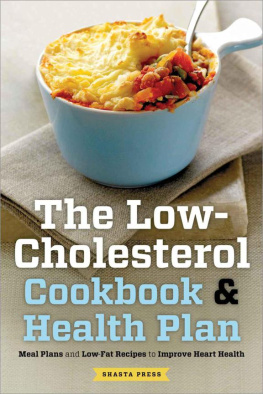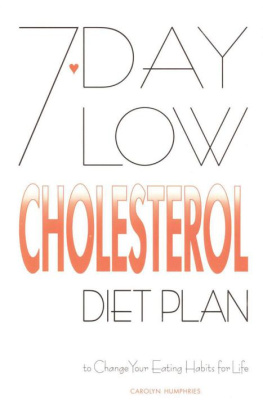
Sign up today to get exclusive access to our authors, exclusive bonuses, and the most authoritative, useful, and cutting-edge information on health, wellness, fitness, and living your life to the fullest.
This book is intended as a reference volume only, not as a medical manual. The information given here is designed to help you make informed decisions about your health. It is not intended as a substitute for any treatment that may have been prescribed by your doctor. If you suspect that you have a medical problem, we urge you to seek competent medical help.
Mention of specific companies, organizations, or authorities in this book does not imply endorsement by the author or publisher, nor does mention of specific companies, organizations, or authorities imply that they endorse this book, its author, or the publisher.
Internet addresses and telephone numbers given in this book were accurate at the time it went to press.
A portion of this book was previously published as Cholesterol Cures by Rodale Inc. in December 2007.
2008, 2017 by Rodale Inc.
All rights reserved. No part of this publication may be reproduced or transmitted in any form or by any means, electronic or mechanical, including photocopying, recording, or any other information storage and retrieval system, without the written permission of the publisher.
Book design by Christopher Rhoads
Library of Congress Cataloging-in-Publication Data is on file with the publisher.
ISBN 9781635650075 paperback
ISBN 9781635650082 e-book

We inspire health, healing, happiness, and love in the world.
Starting with you.
RodaleWellness.com
RodaleBooks.com
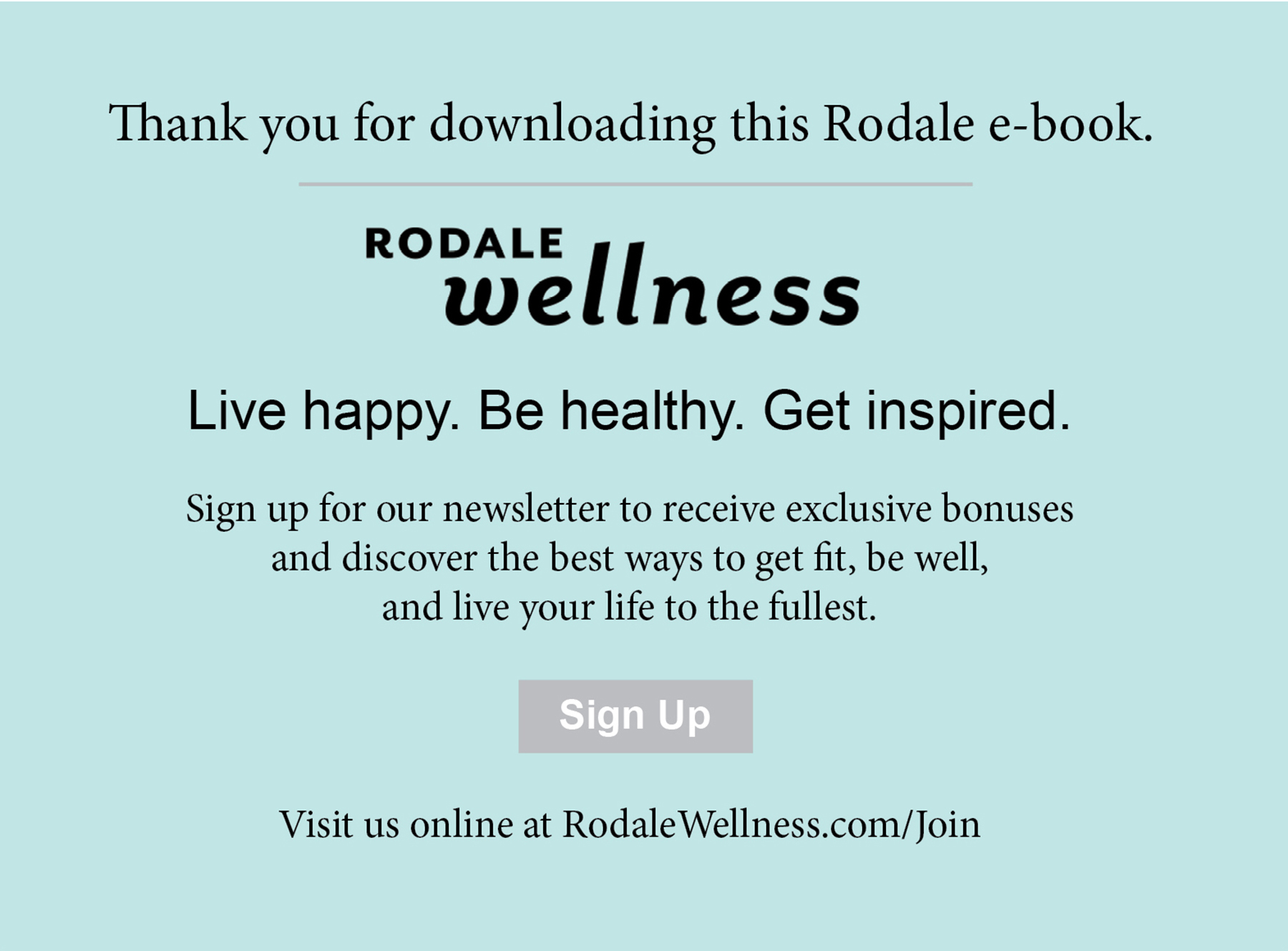
CONTENTS
FOREWORD
In 1948, the town of Framingham, Massachusetts, gave the world a great gift. Half of its residents allowed doctors to study themand, in the decades that followed, their children, grandchildren, and great-grandchildrento help the medical community unravel the mysteries of heart attack and stroke. For nearly 60 years, this studyknown as the Framingham Heart Studyhas been used to reveal the biggest risk factors of heart disease. These include high levels of LDL cholesterol (the bad stuff; more about LDL in the following pages), high blood pressure, and smoking. The Big Three are followed closely by overweight, lack of exercise, diabetes, and stress.
Some of you might be wondering, Arent some people genetically predisposed to high cholesterol? The answer is yes. But as the risk factors above show, we have to take some responsibility for having high cholesterol. After all, about 4.5 billion of the 7.4 billion people on the planet dont have high cholesterol. The average cholesterol level in central China, for example, is 125 milligrams/deciliter (mg/dl).
Fortunately, we can undo the harm caused by high-fat diets, inactivity, and other harmful factors. Thats where this book comes in. It focuses on cholesterol curesthat is, simple things that virtually anyone can do to lower his or her blood cholesterol. Most of these cures focus on the foods we eat (or dont eat) and the lifestyle choices we make. This book also provides scores of no-cholesterol and low-fat menus and recipes that can help you start now to lower your cholesterolto help you reap the health benefits right away.
But be advised: Theres no such thing as a magic bullet. Choosing to take antioxidant supplements, for example, or to eat more garlic while continuing to eat a high-fat diet is unlikely to affect your cholesterol for the better. And use your common sense: Consider these cures as an adjunct to a doctors care, particularly if your cholesterol is over 200 mg/dl.
For years, the American Heart Association; the National Cholesterol Education Program of the National Heart, Lung, and Blood Institute (part of the National Institutes of Health in Bethesda, Maryland); and other health organizations have run huge public service campaigns to alert the public to the risk factors that can lead to heart disease. So many of us know what we have to do to take care of our hearts. But knowledge is useless if its not paired with action.
I encourage you to mount your own personal campaign. To do so is to validate one of the foremost conclusions of the Framingham Heart Study: that the promiseand the privilegeof good health lies in our own hands.
William P. Castelli, MD
Cardiologist at the Heart Center of MetroWest in Framingham, Massachusetts, and former director of the Framingham Heart Study
INTRODUCTION
Getting to Know the Good and the Bad
With all the bad press it receives, you might be surprised to learn that cholesterol isnt actually bad for you.
Quite the contrary, cholesterollike sweat, mucus, and many other unsavory substances produced by the bodyis vital to your health and wellbeing. Its found in every cell, and the fatlike substance is a vital building block in the formation of some hormones.
The problem is that your body produces all the cholesterol it needs on its own. Andas cholesterol-lowering medication commercials are more than willing to tell usthe extra comes from two sources: your family and your diet. Regardless of what is causing it, high blood cholesterol is a cause for major concern: It sets the stage for a host of debilitating health conditions, including arteriosclerosis (hardening of the arteries), heart attack, and stroke. The other frightening aspect of high cholesterol is that many of the people who have it dont even know it. High cholesterol exhibits no signs or symptoms until it progresses into a more serious condition, so the only way to know if you have it is to get tested (more on this later).
When you consider how common high cholesterol is, the numbers are staggering: More than 98 million American adults have blood cholesterol levels above 200 milligrams/deciliter (mg/dl), and more than 31 million of those have levels above 240 mg/dl. (According to the American Heart Association, levels above 200 mg/dl put people at borderline-high risk, while levels above 240 mg/dl are designated high risk.) Moreover, high cholesterol doesnt seem to discriminate: Based on the American Heart Associations most recent statistics, population groups across the boardwhite, black, Hispanic; men and womenall have similarly high cholesterol numbers. It truly is a national epidemic in its scale.
Thats the bad news. The good news is that few, if any, medical conditions are more preventable through lifestyle changes than high blood cholesterol. This is one condition where diet doesnt play a supporting roleits your primary means of defense.
And theres more good news: Taking control of your cholesterol levels can also prevent or reduce other related heart problems. There are solid studies showing that watching your diet, exercising regularly, and reducing your stress level can slow or even reverse atherosclerosis, says Marianne Legato, MD, a professor of clinical medicine at Columbia University College of Physicians and Surgeons in New York City.


